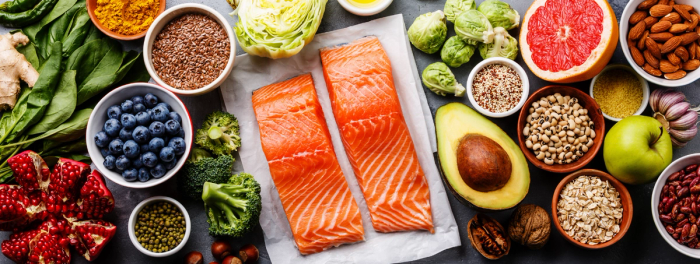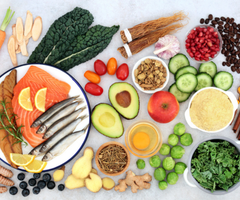question
what type of diet can help to reduce inflammation?
A diet aimed at reducing inflammation can be a valuable component in managing conditions like arthritis. While there isn't a one-size-fits-all approach, certain dietary patterns and food choices have been associated with lower inflammation levels. Here’s a comprehensive overview based on the information in my sources.
Anti-Inflammatory Diet Basics
An anti-inflammatory diet focuses on nutrient-rich, whole foods that can help reduce inflammation in the body. This type of diet typically includes:
- Fruits and Vegetables: Aim for a variety of types and colours, particularly dark leafy greens (like spinach and kale), broccoli, and berries. These foods are rich in antioxidants and vitamins that combat oxidative stress.
- Whole Grains: Incorporate whole grains such as brown rice, quinoa, and whole oats. These provide fibre and essential nutrients.
- Healthy Fats: Opt for healthy fats found in extra virgin olive oil, avocados, nuts, and fatty fish (like salmon and mackerel). Omega-3 fatty acids, in particular, are known for their anti-inflammatory properties.
- Legumes and Beans: Foods like lentils, chickpeas, and black beans are excellent sources of protein and fibre, contributing to overall health.
- Herbs and Spices: Incorporate anti-inflammatory herbs and spices such as turmeric, ginger, and garlic, which may help reduce inflammation and pain.
Foods to Include
Here are specific foods that can be beneficial in an anti-inflammatory diet:
- Fresh Vegetables: Aim for at least four to five servings per day, focusing on a variety of colours.
- Whole Fruits: Consume three to four servings daily, with an emphasis on berries and cherries.
- Fatty Fish: Include sources like salmon, trout, and sardines several times a week.
- Nuts and Seeds: Walnuts, almonds, chia seeds, and flaxseeds are great options. Aim for about 30 grams of nuts daily.
- Whole Grains: Incorporate foods like brown rice, quinoa, and whole grain bread into your meals.
- Legumes: Include beans and lentils regularly for added protein and fibre.
Foods to Limit or Avoid
To effectively manage inflammation, it’s also important to limit or avoid certain foods:
- Processed Foods: These often contain unhealthy fats, sugars, and additives that can promote inflammation.
- Refined Sugars: Found in soft drinks, sweets, and many processed snacks, these can spike blood sugar levels and contribute to inflammation.
- Trans Fats: Common in fried foods and commercially baked goods, trans fats are known to increase inflammation.
- Processed Meats: Sausages, cold cuts, and similar products should be limited due to their inflammatory potential.
- Excessive Alcohol: While moderate consumption may be acceptable, excessive alcohol can exacerbate inflammation.
Lifestyle Considerations
In addition to dietary changes, certain lifestyle factors can also help manage inflammation:
- Regular Exercise: Aim for 30 to 45 minutes of aerobic and resistance training at least four to five times a week. Physical activity can help reduce inflammation and improve overall health.
- Weight Management: Maintaining a healthy weight can decrease inflammation, as excess weight is linked to higher inflammatory markers.
- Stress Management: Chronic stress can contribute to inflammation. Techniques such as meditation, yoga, and mindfulness can be beneficial.
- Quality Sleep: Ensure you get enough restful sleep, as poor sleep can exacerbate inflammation.
Conclusion
While an anti-inflammatory diet won't cure arthritis, it can be an effective way to manage symptoms and improve overall health. Incorporating a variety of whole, nutrient-rich foods while limiting processed and inflammatory foods can help reduce inflammation in the body.
If you have specific dietary concerns or conditions, it’s always best to consult with a healthcare professional or a dietitian who can provide tailored advice. They can help ensure that your diet meets your individual needs while supporting your health goals.
This information is not a substitute for professional medical advice, diagnosis or treatment. Always consult a registered healthcare professional about matters that affect your health. Clara uses artificial intelligence to generate general information for personal educational purposes only, not intended to be a management plan and it may contain errors, inaccuracies or may oversimplify concepts.








